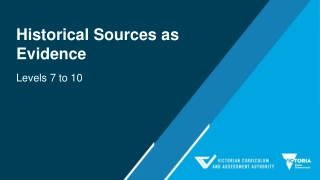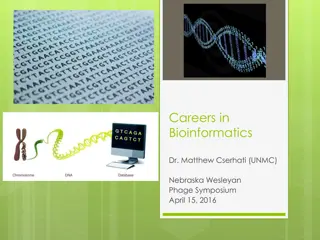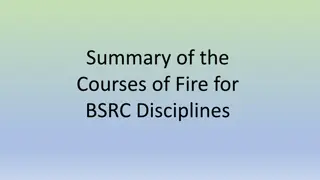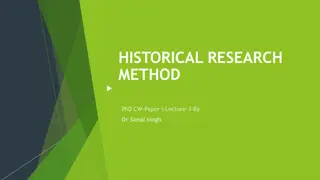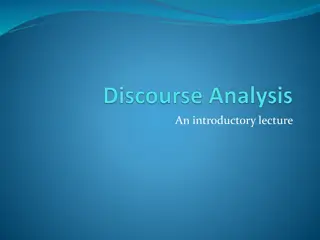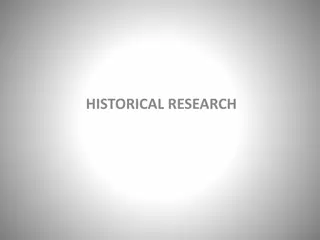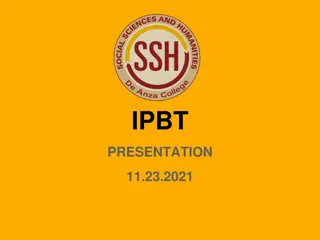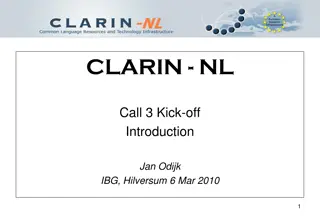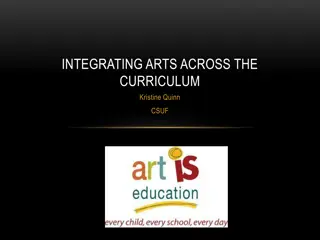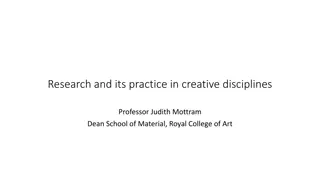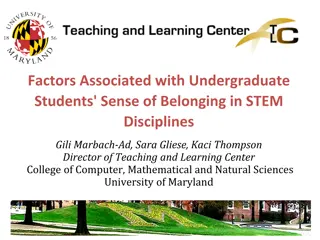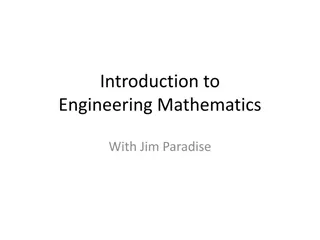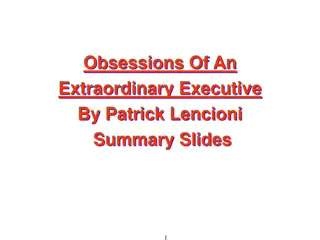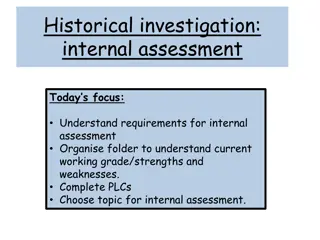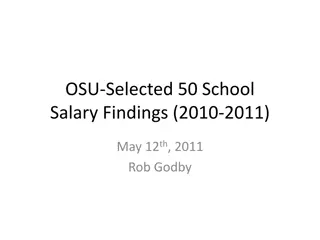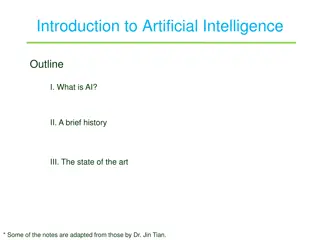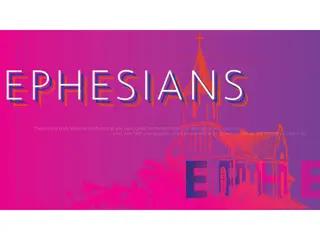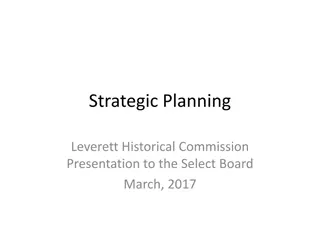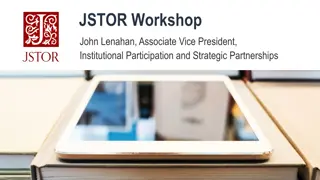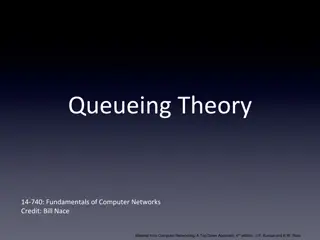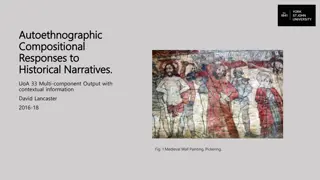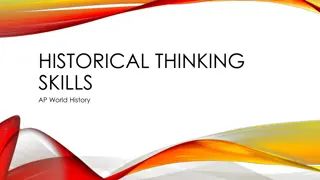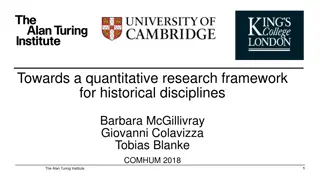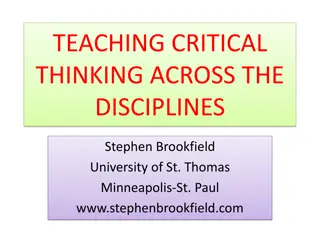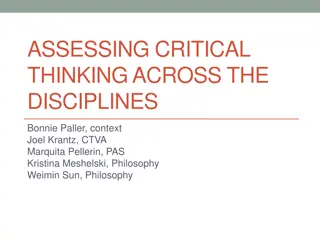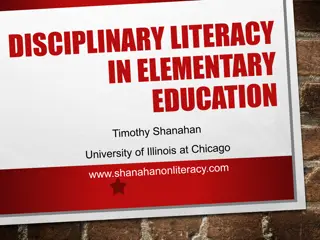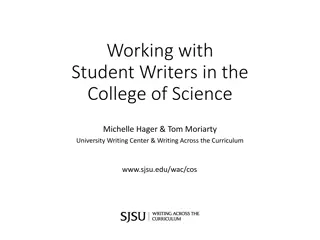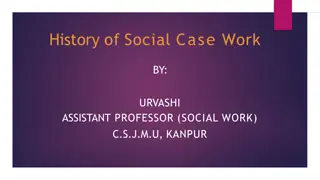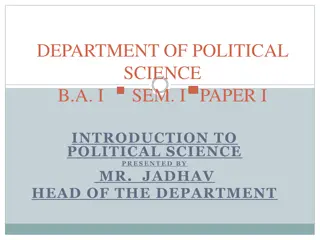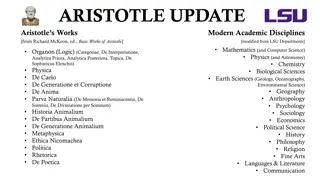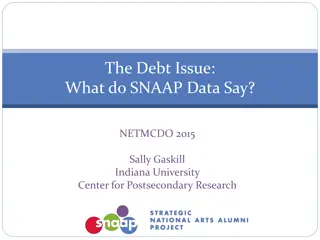Historical Sources as Evidence
Explore the importance of historical sources as evidence in the Victorian Curriculum History context, focusing on how students analyze, evaluate, and utilize sources to create historical explanations and arguments. Discover the significance of primary and secondary sources, perspectives of historica
1 views • 46 slides
Challenges and Solutions in Implementing Historical Competencies in Teaching
Explore the complexities and obstacles faced in implementing historical competencies in teaching, as discussed by Jens Aage Poulsen, a senior lecturer and researcher at HistoryLab, University College Lillebaelt, Denmark. The content delves into competence-based curriculum, core historical competenci
0 views • 7 slides
Exploring Bioinformatics: Careers, Research, and Disciplines
Bioinformatics is an interdisciplinary field combining biology, computer science, mathematics, and statistics. Dr. Matthew Cserhati, a bioinformatics programmer, has a background in biology and software engineering. His research includes projects like NeuroAIDS database development and Staphylococcu
2 views • 46 slides
Courses of Fire for BSRC Disciplines
Moving targets such as Running Deer, Running Boar, and Running Target are disciplines commonly shot from the standing position without support in BSRC competitions. Each discipline has specific courses of fire, including the number of runs, direction, shot count, and allowed shooting aids. Additiona
1 views • 17 slides
Interdisciplinary Approach in Political Science and Its Relation with History
The need for an interdisciplinary approach in political science emerged in the 20th century to study political issues from various social science perspectives. This approach emphasizes the interrelation between political science and other disciplines like history. History provides the foundation for
0 views • 23 slides
Significance of Models in Agricultural Geography
Models play a crucial role in various disciplines, including agricultural geography, by offering a simplified and hypothetical representation of complex phenomena. When used correctly, models help in understanding reality and empirical investigations, but misuse can lead to dangerous outcomes. Longm
0 views • 8 slides
Overview of Media Studies Disciplines and Historical Development
Media studies is a multidisciplinary field that explores the content, history, and effects of various media, with roots in the relationship between media and culture. Originating in the 1920s, media studies draws on traditions from social sciences and humanities, incorporating theories from discipli
5 views • 18 slides
Understanding Historical Research Methods
Historical research is a systematic approach to investigating past events, developments, and experiences. It involves critical examination of evidence, interpretation of sources, and tracing of historical trends to gain insights into social changes. Various definitions by scholars like Kerlinger, Wh
1 views • 21 slides
Understanding Discourse Analysis: An Overview
Discourse analysis is the study of language in use within its social context. It involves analyzing written or spoken language to understand how it is employed in real-life situations. This research method focuses on the purposes and effects of language, cultural conventions, communication of values
2 views • 22 slides
Understanding Historical Research: Methods, Purposes, and Aims
Historical research involves investigating past events systematically to provide a dynamic explanation, interpretation, and understanding of the past. It aims to uncover unknown aspects, answer unexplored questions, and link past happenings to the present to enrich human culture and encourage interd
0 views • 20 slides
Social Sciences & Humanities Faculty Division Overview
This presentation provides an overview of the Social Sciences & Humanities faculty division within the institution. It includes information on full-time faculty members, chairs, and the dean's office. The faculty chart lists the various disciplines such as Paralegal, Administration of Justice, Econo
0 views • 5 slides
Overview of CLARIN-NL Call 3 Projects and Developments
The document provides an overview of the CLARIN-NL Call 3 projects and developments, including information on submissions, awarded projects, disciplines covered, distribution by prioritized disciplines, and subdisciplines of linguistics. It details the open and closed calls, selected disciplines, an
0 views • 28 slides
Integrating Arts Across the Curriculum for Enhanced Learning
Enhancing education through arts integration across various disciplines such as language arts, social studies, science, and math. Recognizing the benefits of arts education in fostering creativity, problem-solving skills, and cultural understanding among students. Encouraging students to communicate
1 views • 18 slides
Gospel-Powered Spiritual Disciplines: Fasting and Reflection on Biblical Teachings
Reclaiming the essence of Gospel-powered spiritual disciplines, focusing on fasting, prayer, and solitude. Reflecting on teachings from Luke 5:33-39 and Matthew 6:1-18 about humility, sincerity, and the rewards of true piety.
1 views • 33 slides
Enhancing Research and Learning in Creative Disciplines
Explore the role of research in creative disciplines, the importance of universities in fostering knowledge exchange, and initiatives like the UK Higher Education Funding Council and EU programs to enhance research, learning, and innovation in higher education.
6 views • 52 slides
Factors Affecting Undergraduate Students' Sense of Belonging in STEM Disciplines
Student attrition in STEM fields remains a critical issue, with women and underrepresented minority students facing higher dropout rates. Sense of belonging is identified as a key factor influencing retention, particularly for female and URM students. This study explores various aspects, including r
0 views • 22 slides
Understanding Engineering Mathematics Fundamentals
Explore the core concepts of Algebra, Geometry, Trigonometry, and Calculus in engineering mathematics. Discover the historical roots, essential properties, and real-world applications of these mathematical principles, along with the significance of calculus for engineering students. Gain insights in
0 views • 41 slides
The Four Disciplines of a Healthy Organization Summary Slides
The book "Obsessions of an Extraordinary Executive" by Patrick Lencioni outlines the Four Disciplines of a Healthy Organization, emphasizing the significance of organizational clarity, cohesive leadership teams, and effective communication. Lencioni highlights the importance of minimizing confusion,
0 views • 7 slides
Requirements for Historical Investigation Internal Assessment
Understand the 25% weightage internal assessment comprising 3 sections for a historical investigation. Focus on source evaluation, investigation, and reflection within a 2,200-word limit. Choose a historical topic, analyze primary and secondary sources, and consider causation, consequence, continuit
0 views • 18 slides
Exploring a Cross-Curricular Approach to Earth Science Curriculum
Integrating Earth Science with topics such as Geology, Meteorology, Oceanography, and Astronomy, while incorporating Fine Arts, Social Studies, Language & Literature, and other sciences and math disciplines. The curriculum delves into historical events like the eruption of Krakatoa, impacts on art s
0 views • 32 slides
Understanding Historical Context in Skills Development Discourses
Exploring the evolution of apprenticeship and skills development through historical sociology, historical futures, modes of justification, and complexity concepts. Emphasizing the importance of nuanced historical understanding to navigate contemporary challenges in South Africa's skills development
0 views • 29 slides
Comparison of Faculty Salaries in UW Disciplines
Analysis of faculty salary data for Professors, Associate Professors, and Assistant Professors in selected UW disciplines compared to the average across 50 schools and OSU in 2010-2011. The findings show varying salary percentages in different disciplines and ranks. Notable trends include assistant
0 views • 9 slides
Introduction to Artificial Intelligence: A Comprehensive Overview
Artificial Intelligence (AI) is a fascinating field that aims to make machines think and act intelligently. The outline covers the definition of AI, its historical development, and the current state of the art, including the capabilities required to pass the Turing test. The notes touch on various a
0 views • 19 slides
Embracing Spiritual Disciplines for Growth in Christ
Explore the importance of spiritual disciplines in deepening your relationship with Christ. Discover how these practices, rooted in Scripture, can help you emulate God's love, prioritize your faith, and reject misconceptions about earning grace. Understand that true discipline does not confine but r
0 views • 16 slides
Leverett Historical Commission Strategic Planning Presentation Overview
Leverett Historical Commission identifies issues with ad hoc requests, lack of clarity on historical property significance, and inadequate maintenance plans. A strategic plan is needed to define assets, determine significance, create guidelines, prioritize restoration efforts, and establish funding
0 views • 9 slides
Exploring JSTOR's Impact on Student Engagement and Academic Research
Discover how JSTOR, through its innovative approach, supports student engagement and academic research across diverse disciplines and institutions. Learn about the significant role JSTOR plays in shaping educational experiences and enhancing scholarly pursuits, as evidenced by its usage in secondary
0 views • 26 slides
Understanding Queueing Theory in Computer Networks
Queueing theory is a powerful analytic tool used to analyze performance in queueing processes, applicable in various industries including retail, manufacturing, and computer networks. It involves studying characteristics such as arrival patterns, service patterns, and queue disciplines to make perfo
0 views • 61 slides
Exploring Historical Narratives through Music and Art
This submission presents two original compositions that delve into historical narratives through a unique blend of music and visual art. The compositions aim to reinterpret stories from the past, creating innovative structures and forms. By intertwining various perspectives and utilizing cinematic t
0 views • 8 slides
Historical Source Analysis Exam Questions Overview
The provided content outlines exam questions related to historical sources, guiding students on analyzing, evaluating, and interpreting information from different sources. The questions cover a range of topics such as learning from sources, assessing accuracy, understanding significance, and making
0 views • 12 slides
Developing Historical Thinking Skills in AP World History
AP History classes aim to cultivate apprentice historians by fostering historical thinking skills (HTS). These skills include Chronological Reasoning, Comparison and Contextualization, Crafting Historical Arguments, and Historical Interpretation. Each skill set equips students with the ability to an
0 views • 15 slides
Quantitative Research Framework for Historical Disciplines
Scholarly communities in historical disciplines are combining quantitative and qualitative methods to study phenomena that change over time. The proposed general methodological reflection aims to enhance research in historical linguistics through quantitatively driven models and claims. Quantitative
0 views • 18 slides
Enhancing Critical Thinking: Strategies and Practices Across Disciplines
Explore the multifaceted dimensions of critical thinking in teaching and learning across various disciplines. Uncover the importance of identifying assumptions, the role of different traditions in promoting critical thought, and practical techniques like the Circle of Voices. Discover how critical t
0 views • 16 slides
Enhancing Critical Thinking Skills Across Disciplines
Explore strategies for fostering critical thinking skills through various disciplines, including identifying levels of critical thinking, designing effective assignment prompts, and addressing real-world issues like sustainability and political participation. Understand the importance of prompting r
0 views • 31 slides
Exploring Disciplinary Literacy in Education
Educators have long emphasized the importance of content area reading to improve students' comprehension and study skills across various subjects. However, disciplinary literacy goes beyond basic reading skills, focusing on how different disciplines create, communicate, and evaluate knowledge throug
0 views • 42 slides
Enhancing Student Writers' Skills in Science Disciplines
Student writers in the College of Science may struggle with transferring writing skills to new contexts. This article explores why writers forget and provides strategies for teachers to assist students in mastering unique writing genres within science disciplines.
0 views • 25 slides
Evolution of Social Case Work: A Historical Overview
Explore the rich history of social case work in the United Kingdom, United States, and India, from charity-based initiatives to the development of professional social work disciplines. Learn about the types of poor individuals identified throughout history and the evolution of relief programs to cat
0 views • 14 slides
Introduction to Political Science: State, Democracy, and Sub-disciplines
Explore the fundamental concepts in political science including the state, democracy, and sub-disciplines such as political theory, public administration, and international politics. Delve into the meaning, definition, and nature of political science as well as the essential components of the state
0 views • 5 slides
Aristotle's Works in Modern Academic Disciplines and Political Science
Explore Aristotle's works in disciplines such as Mathematics, Physics, Logic, Chemistry, Political Science, and more. Delve into his insights on political theory, regimes, and governance for the common good and ruler's advantage.
0 views • 6 slides
Understanding the Triune Nature of God: Theology Studies and Biblical Perspectives
Delve into the exploration of the triune nature of God through theological disciplines such as Biblical, Historical, Dogmatic, and Systematic theology. Discover profound insights from Michael Reeves' "Delighting in the Trinity" and various biblical references highlighting the oneness and threeness o
0 views • 27 slides
The Impact of Student Loan Debt on Music Majors: A SNAAP Data Analysis
SNAAP data reveals insights into student loan debt among music majors, showing trends in debt levels, disciplines, recent vs. non-recent graduates, and the impact of debt on music education. The findings highlight the financial challenges faced by music students and the varying levels of debt incurr
0 views • 15 slides
